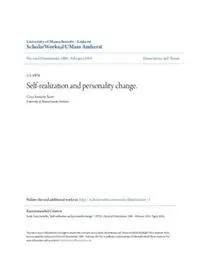Table Of ContentUniversity of Massachusets Amherst
SELF-REALIZATION AND PERSONALITY CHANGE
A Dissertation
By
Cora Annette Scott
Submitted to the Graduate School of the
University of Massachusetts in partial
fulfillment of the requirements for the degree
DOCTOR OF PHILOSOPHY
August 1974
Major Subject Clinical Psychology
ii
(c) Cora Annette Scott 1974
All Rights Reserved
iii
SELF-REALIZATION AND PERSONALITY CHANGE
A Dissertation
By
Cora Annette Scott
Approved as to style and content by:
J.
Richard Bogartz, ?Y\3J9 Shairman of Committee
Sheldon Cashdan, Ph.D., Member
Theodore Slovin, Ph.D., Member
Daniel Jordan/ PhM5. , Member
Jbhrt Donohoe, Ph.D., Acting Head
Department of Psychology
August, 197U
iv
ACKNOWLEDGEMENT
I wish to acknowledge, with thanks, the
members of my committee,
Dr. Richard Bogartz, Dr. Theodore Slovin, Dr. Sheldon
Cashdan, and
Dr. Daniel Jordan, for their support and encouragement of
a study
which was non-traditional both in content and approach. I would
also
like to thank Richard Taupier for his assistance with the workshop
and his always helpful suggestions.
V
ABSTRACT
Self-Realization and Personality Change
Cora Annette Scott, B.A. , Boston University
M.S., University of Massachusetts
Directed hy: Dr. Richard Bogartz
A new dimension in the nature of man is coming into view in modern
psychology. This dimension may be termed the Self . It is the central
core, the deep source and foundation of the empirical self, the latter
being comprised of constantly changing thoughts, emotions and physical
states. The Self may be known and experienced through the transcendence
of the normal state of consciousness to a higher level of conscious
functioning, known as the "peak" or mystical experience. In both
Eastern and Western spiritual disciplines, methods for attaining higher
levels of consciousness have been developed over many centuries and
are remarkably similar. Self-realization by these methods, it is
claimed, can result In increasing integration and growth of the indi-
vidual, and the healing of some forms of neurosis. It can lead also
to enhanced creativity and improved relationships with others.
The present study was an attempt to explore the effects of these
methods in promoting personality change in a positive direction along
preselected lines. A workshop, in which subjects were taught techniques
was conducted over
visualization and self-observation,
of meditation,
a six-month period. Individual meditation programs were worked out
for participants- in line with the goal of Self-realization, and
vi
designed to aid in overcoming personality traits which they perceived
as obstacles in the way of reaching that goal. Eighteen subjects com-
pleted the workshop. Of these, nine obtained positive change in
preselected behavior; two achieved mixed results, i.e., change in some
but not all preselected behavior; two obtained change in behavior which
was not preselected; four achieved no positive change; and one changed
in a negative direction. One interesting finding was that, of six
individuals who were identified at the beginning of the workshop as
having greater than average problems of adjustment, only one achieved
positive change. These results indicate that the workshop program would
not by itself be useful as a therapeutic procedure, but for those of
average psychological health it may be effective in promoting personality
growth and integration, and improved interpersonal relationships. It
was concluded that the results lend support to some of the claims of
Eastern and Western spiritual traditions.
vii
TABLE OF CONTENTS
CHAPTER I - Introduction 1
CHAPTER II - Method 48
CHAPTER III - Results 55
Individual 55
154
Group
CHAPTER IV - Discussion 159
165
CHAPTER V - Summary
167
REFERENCES
172
APPENDICES
1
CHAPTER I
INTRODUCTION
The Self
In the psychological conception of the nature of man, a new di-
mension is gradually coming into view in our time. It was first
glimpsed by William James, at the turn of the century, then later by
C. G. Jung. Today it Is drawing the attention of a growing number of
psychologists, particularly within the humanistic sector. This new
dimension may be termed the Self .
I have capitalized it in order to distinguish it from the self of
traditional psychology which, according to Wylie, "has been used in
many different ways. Two chief meanings emerge, however: the self as
subject or agent, and the self as the individual who is known to
himself" (1961, p. 1). The Self, strictly speaking, is neither of
these, although it is directly related to the first. Homey appears
to be touching on the concept when she speaks of "the real self as that
central inner force, common to all human beings and yet unique in each,
which is the deep source of growth" (1950, p. 17), distinguishing it
from both the actual or empirical self and the idealized, unrealistic
self. O'Connell makes a similar distinction:
When I speak of person , I am referring to the central, core, or
center, of the human organism . . . Personality is something
7thli "than this central core. For as personality, the human
individual functions on the periphery of himself, ana his aware-
ness is then of division in his consciousness. (19 71, pp. 3o-J/.;
The Self, like other components of human nature, can be explored
and studied, if we are willing to go beyond the limitations imposed by

